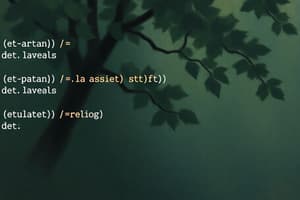Podcast
Questions and Answers
Given the expression x = a++ + b, where a is 5 and b is 10 initially, what is the value of x and a after execution?
Given the expression x = a++ + b, where a is 5 and b is 10 initially, what is the value of x and a after execution?
- x = 16, a = 5
- x = 16, a = 6
- x = 15, a = 5
- x = 15, a = 6 (correct)
What is the output of the following code snippet?
int fun(int x) {
return x++;
}
int main() {
int y = 5;
int z = fun(y);
printf("%d %d", y, z);
return 0;
}
What is the output of the following code snippet?
int fun(int x) {
return x++;
}
int main() {
int y = 5;
int z = fun(y);
printf("%d %d", y, z);
return 0;
}
- 6 6
- 6 5
- 5 5 (correct)
- 5 6
What does the sizeof operator return in C?
What does the sizeof operator return in C?
- The address of a variable.
- The value stored in a variable.
- The data type of a variable.
- The size, in bytes, of a variable or data type. (correct)
What is the purpose of a left shift operator (<<)?
What is the purpose of a left shift operator (<<)?
In C, what is the difference between declaring and initializing a variable?
In C, what is the difference between declaring and initializing a variable?
Which of the following is NOT a valid keyword in C?
Which of the following is NOT a valid keyword in C?
What is the scope of a global variable in C?
What is the scope of a global variable in C?
Given the code #define SIZE 10, what is SIZE?
Given the code #define SIZE 10, what is SIZE?
What is the main difference between const and #define when defining constants in C?
What is the main difference between const and #define when defining constants in C?
What is the output of the following code snippet?
#include <stdio.h>
int main() {
int x = 0x1A; // Hexadecimal representation
printf("%d", x);
return 0;
}
What is the output of the following code snippet?
#include <stdio.h>
int main() {
int x = 0x1A; // Hexadecimal representation
printf("%d", x);
return 0;
}
In C, what happens if you try to assign a value larger than the maximum range of a data type (e.g., assigning a large number to a short int)?
In C, what happens if you try to assign a value larger than the maximum range of a data type (e.g., assigning a large number to a short int)?
What is a static variable in C?
What is a static variable in C?
What is the difference between local and global variables in C?
What is the difference between local and global variables in C?
Which of the following describes the correct order of evaluation for the expression a + b * c in C, assuming standard operator precedence?
Which of the following describes the correct order of evaluation for the expression a + b * c in C, assuming standard operator precedence?
Given a 32-bit system, what is the typical size (in bytes) of an int data type?
Given a 32-bit system, what is the typical size (in bytes) of an int data type?
What is the significance of the ASCII encoding in C programming?
What is the significance of the ASCII encoding in C programming?
What is the likely output of the following code snippet?
int a = 5;
int b = (a > 3) ? 10 : 20;
printf("%d", b);
What is the likely output of the following code snippet?
int a = 5;
int b = (a > 3) ? 10 : 20;
printf("%d", b);
Which header file is typically required to use the printf function in a C program?
Which header file is typically required to use the printf function in a C program?
Given int x = 5;, what is the difference between x++ and ++x?
Given int x = 5;, what is the difference between x++ and ++x?
What will be the output of the following C code?
#include <stdio.h>
int main() {
int x = 5;
printf("%d ", x << 2);
return 0;
}
What will be the output of the following C code?
#include <stdio.h>
int main() {
int x = 5;
printf("%d ", x << 2);
return 0;
}
Flashcards
C Programming Language
C Programming Language
A programming language used to instruct a computer to perform tasks.
Operator Precedence
Operator Precedence
Rules that dictate the order in which operators are evaluated in an expression.
Associativity Rules
Associativity Rules
Rules that determine the order of evaluation when operators of the same precedence appear in an expression.
Increment Operator (++)
Increment Operator (++)
Signup and view all the flashcards
Decrement Operator (--)
Decrement Operator (--)
Signup and view all the flashcards
Post-increment
Post-increment
Signup and view all the flashcards
Pre-increment
Pre-increment
Signup and view all the flashcards
Data Type
Data Type
Signup and view all the flashcards
Left Shift Operator
Left Shift Operator
Signup and view all the flashcards
sizeof Operator
sizeof Operator
Signup and view all the flashcards
Keyword
Keyword
Signup and view all the flashcards
Constant
Constant
Signup and view all the flashcards
Global Variable
Global Variable
Signup and view all the flashcards
Local Variable
Local Variable
Signup and view all the flashcards
Static Variable
Static Variable
Signup and view all the flashcards
Initialization
Initialization
Signup and view all the flashcards
Declaration
Declaration
Signup and view all the flashcards
Study Notes
C Programming Language Basics
- The lecture discusses C programming language, starting with the basics like "Hello World."
- The syllabus includes basic concepts, I/O operations, data types, operators, expressions, control flow statements, functions, arrays, string handling, structures, unions, enumerations, file handling, and the preprocessor.
- The lecture focuses on basic concepts and previous year question papers, especially MCQs.
- The initial topic is operators, especially arithmetic operators.
- Operator precedence rules (BODMAS) are important in C programming.
- Associativity rules determine the order of operations when operators have the same precedence.
- Increment (++) and decrement (--) operators are discussed with examples.
- Post-increment and pre-increment operators behave differently.
- Post-increment means the value is used first, then incremented, while pre-increment increments first, then uses the value.
Code Snippets and Questions
- A code snippet involving post-increment is discussed.
- Another question involves a function call and understanding the return value.
- A code example with hexadecimal values and decimal conversion is shown.
- Understanding of conditional operators and expressions is required to determine the output.
- The lecture includes questions that test your understanding of different data types and operators.
Data Types and Variables
- Different data types (int, float, char) have different sizes.
- 16-bit, 32-bit, and 64-bit systems can affect the size and range of data types.
- Shifting operators (left shift <<, right shift >>) are used to multiply or divide by powers of 2.
- The
sizeofoperator returns the size of a variable or data type in bytes. - The importance of understanding data type ranges for avoiding overflow is highlighted.
- Character encoding (ASCII) is briefly touched upon.
Keywords and Constants
- Keywords have special meanings in C and cannot be used as variable names.
auto,double,breakand other keywords are reserved.- Constants can be defined using
#defineorconst.
Global vs. Local Variables
- Global variables are defined outside functions and have global scope.
- Local variables are defined inside functions and have local scope.
- Static variables retain their value between function calls.
- The difference between initialization and declaration of variables is important.
- Some questions test your basic understanding of global and local variables.
Function-related questions:
- Questions about function parameters and variables.
- Main aim today is to create video to provide access to all these solutions and help enhance learning.
Studying That Suits You
Use AI to generate personalized quizzes and flashcards to suit your learning preferences.





